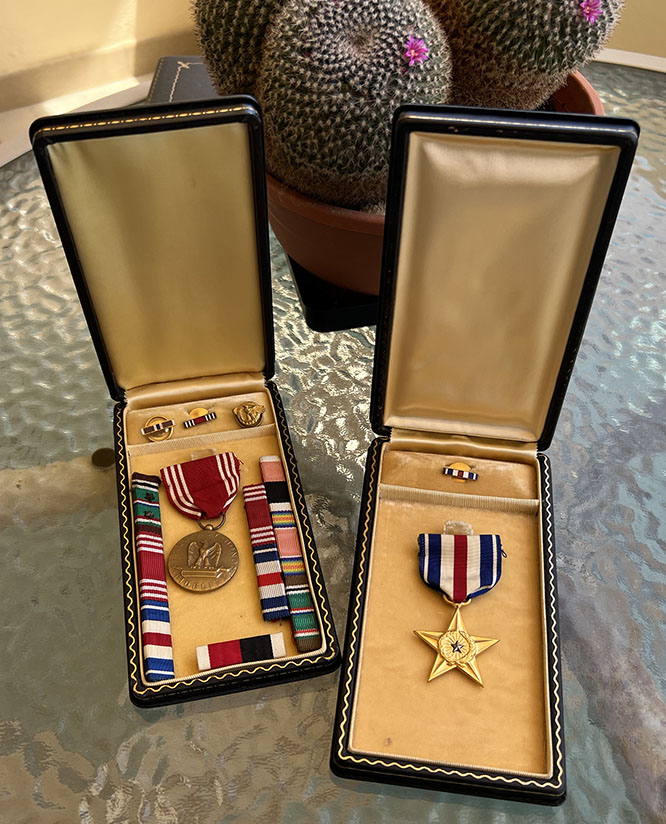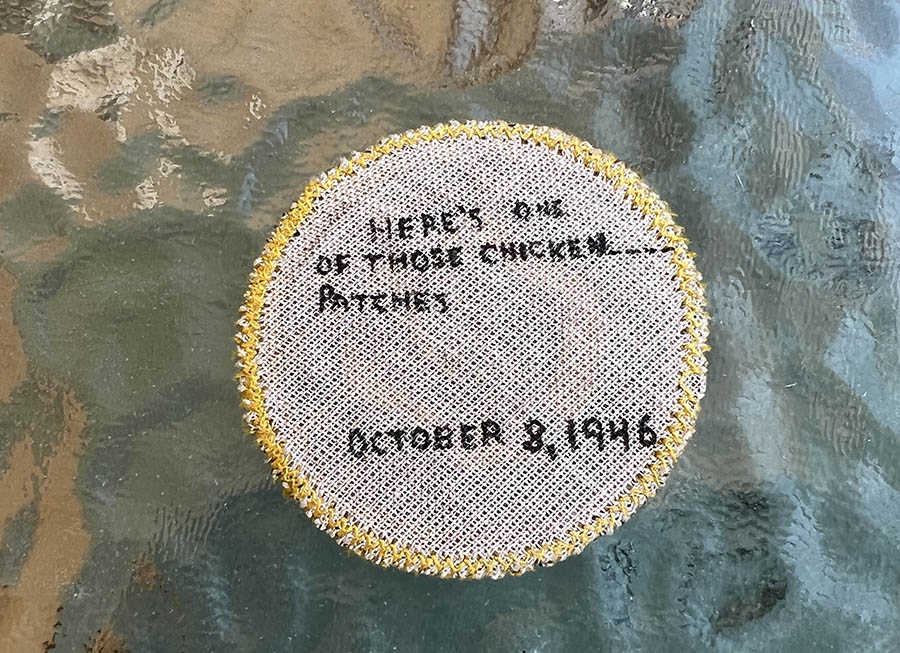La versión en español está después de la versión en inglés.
Not that big one. I’m talking WW2. Among the treasures I found in that cabinet last week, were a number of things from my father’s World War II experience.
My mother had what I was told were all his medals framed around 1970, which included two silver stars. When my mother died in 2016, I gave that frame to The Kid Brother. He has it proudly displayed on his bedroom wall. Some years after my father died, I found boxes, containing a silver and a bronze star. My mother said they were just extras, which I thought was odd. But after my mother’s death, I found documentation of each of the medals.
My father was a member of the 9th Armored Division. Both a silver star and bronze star were received in 1945 for the Battle of Remagen (click here), which lasted 18 days. My father wasn’t yet 19 years old. He enlisted when he was 18 and reenlisted two years later without discussing it first with my mother (they weren’t yet married). In 1948, he took a leader’s course and his commanding officer, Major Walter Sharp, wrote a letter to my mother (they had been married 9 months at the time and she was all of 21 years old) congratulating her on her husband’s achievement, telling her of my father’s assured advancement, hoping to convince her to support my father in his desire to make the army his career. It didn’t work.
So my father left the army at the age of 22 as a staff sergeant and returned to New York. A few years later, he began a 34-year career with AT&T. He began as a lineman, which I found very cool when I was very young. He climbed telephone poles and even called us from up high (although I wonder now if my parents were just making that up). He did well, but I don’t think he was ever happy there. He was happy as a soldier. I never once heard my father talk about his time in the Army.
.
No ese grande. Estoy hablando de la Segunda Guerra Mundial. Entre los tesoros que encontré en ese gabinete la semana pasada, había varias cosas de la experiencia de mi padre en la Segunda Guerra Mundial.
Mi madre tenía lo que me dijeron que eran todas sus medallas enmarcadas alrededor de 1970, que incluían dos estrellas de plata. Cuando mi madre murió en 2016, le di ese marco a El Hermanito. Lo tiene exhibido con orgullo en la pared de su dormitorio. Algunos años después de la muerte de mi padre, encontré cajas que contenían una estrella de plata y otra de bronce. Mi madre dijo que solo eran extras, lo que me pareció extraño. Pero después de la muerte de mi madre, encontré documentación de cada una de las medallas.
Mi padre fue miembro de la 9ª División Blindada. Tanto una estrella de plata como una estrella de bronce fueron recibidas en 1945 por la Batalla de Remagen (haz clic aquí), que duró 18 días. Mi padre aún no tenía 19 años. Se alistó cuando tenía 18 años y se volvió a alistar dos años después sin discutirlo primero con mi madre (aún no estaban casados). En 1948, tomó un curso de líder y su oficial al mando, el Mayor Walter Sharp, le escribió una carta a mi madre (en ese momento habían estado casados 9 meses y ella tenía 21 años) felicitándola por el logro de su esposo, diciéndole ella del avance asegurado de mi padre, con la esperanza de convencerla de apoyar a mi padre en su deseo de hacer del ejército su carrera. No funcionó.
Entonces mi padre dejó el ejército a la edad de 22 años como sargento y regresó a Nueva York. Unos años más tarde, comenzó una carrera de 34 años en AT&T. Comenzó como liniero, lo que me pareció muy bueno cuando era muy joven. Se subió a los postes telefónicos e incluso nos llamó desde lo alto (aunque ahora me pregunto si mis padres se lo estaban inventando). Lo hizo bien, pero no creo que nunca fuera feliz allí. Era feliz como un soldado. Nunca escuché a mi padre hablar sobre su tiempo en el ejército.


• Escudo del Regimiento de Infantería 30. Gracias a TexasTrailerParkTrash por encontrar esto en línea. (haz clic aquí)




• En Frente: Parche de Policía del Ejército de Ocupación, una fuerza de élite en Alemania Occidental y Austria, 1946–1952.

• Schwabach (cerca de Nuremberg), Alemania Occidental, 5 de agosto de 1947, con su parche de policía. El nombre del perro era Stroopie.




